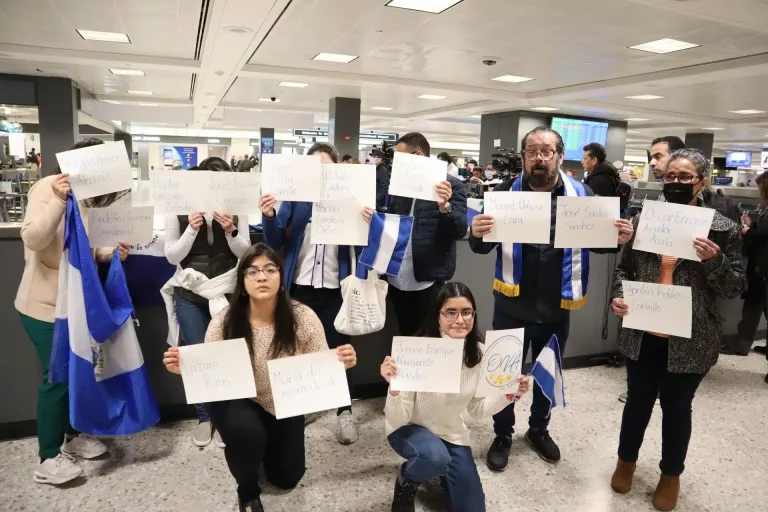12 de febrero 2023

Children of Exile: The Births “Sowing Hope” in the Camp of Nicaraguan Farmers

PUBLICIDAD 1M
PUBLICIDAD 4D
PUBLICIDAD 5D
A total of 222 Nicaraguan political prisoners were sent to the United States by the regime of Daniel Ortega and Rosario Murillo

A total of 222 Nicaraguan political prisoners were sent to the United States by the regime of Daniel Ortega and Rosario Murillo
In the early hours of February 9, a total of 222 Nicaraguan political prisoners were released by Daniel Ortega and Rosario Murillo. Among them are those who were in the La Modelo and La Esperanza prisons, and those who were in the El Chipote prison and under house arrest.
Hundreds of prisoners of conscience were removed from their cells and transported in buses to a then-unknown destination. They were taken to the airport and put on a charter flight that would land around noon Thursday, February 9 at Dulles Airport, outside Washington, D.C.
Welcomed in the United States by an obvious agreement between the two governments, the Biden Administration affirmed that this operation opens a door to dialogue. The question this raises is: dialogue with what objective? It bears noting that the word “released” is not synonymous with “freed”. It so happens that at the root of that decision lie as many violations of law as those that landed these people in prison in the first place.
The released prisoners were technically deported; that is, banished. They were stripped of their nationality and all their civil rights, banned for life from holding public office, and their property was expropriated. All this by virtue of having been accused of “treason”.
Such was why a few of those selected to be released did not accept the deal and did not travel. This is the case of Monsignor Álvarez, for example, who was transferred from house arrest to El Chipote.
Any release of a political prisoner is welcome, but it cannot distort the reading of what happened. This is why Secretary of State Blinken’s statement calling the release “a constructive step towards resolving human rights abuses” sounded overly optimistic.
I hope this is the case, although it is difficult to imagine anything constructive on the part of the Ortega-Murillo regime. By imprisoning opponents, the dictatorship violates their rights and commits crimes against humanity: murder, torture and incarceration or other serious deprivation of physical liberty in violation of, among others, the fundamental norms of international law. But the regime also commits those crimes by releasing them.
In fact, the terms of the release constitute a virtual confession. Article 7 of the Rome Statute of the International Criminal Court classifies “the deportation or forcible transfer of people” as a crime against humanity; in other words, the forced displacement of affected persons by expulsion or other coercive acts from the area in which they are legitimately present, without grounds authorized by international law.
It also classifies the crime of “persecution of a group or collective with its own identity”; that is, the intentional and serious deprivation of fundamental rights in violation of international law by reason of the identity of that group. All of this constitutes a “crime against humanity”, acts that are committed as part of a widespread or systematic attack against a civilian population and with knowledge of such an attack.
For its part, the Inter-American Court of Human Rights has adopted in its jurisprudence, cases that address the right to nationality, establishing it as a fundamental human right and upholding, in addition, that its violation often comes with the denial of other civil and political rights.
The case of the Nicaraguan ex-prisoners underscores the point. This is how Latin American dictatorships work today. Violating rights and committing crimes against humanity is the norm. They restrict rights even when they confer them. They restrict freedom even when it is granted.
This article was originally published in Spanish in Confidencial and translated by Havana Times.
PUBLICIDAD 3M
Académico argentino. Actualmente es profesor en el Centro de Estudios Latinoamericanos en la Universidad de Georgetown. Es autor de varios libros y articulista de opinión en diferentes medios.
PUBLICIDAD 3D